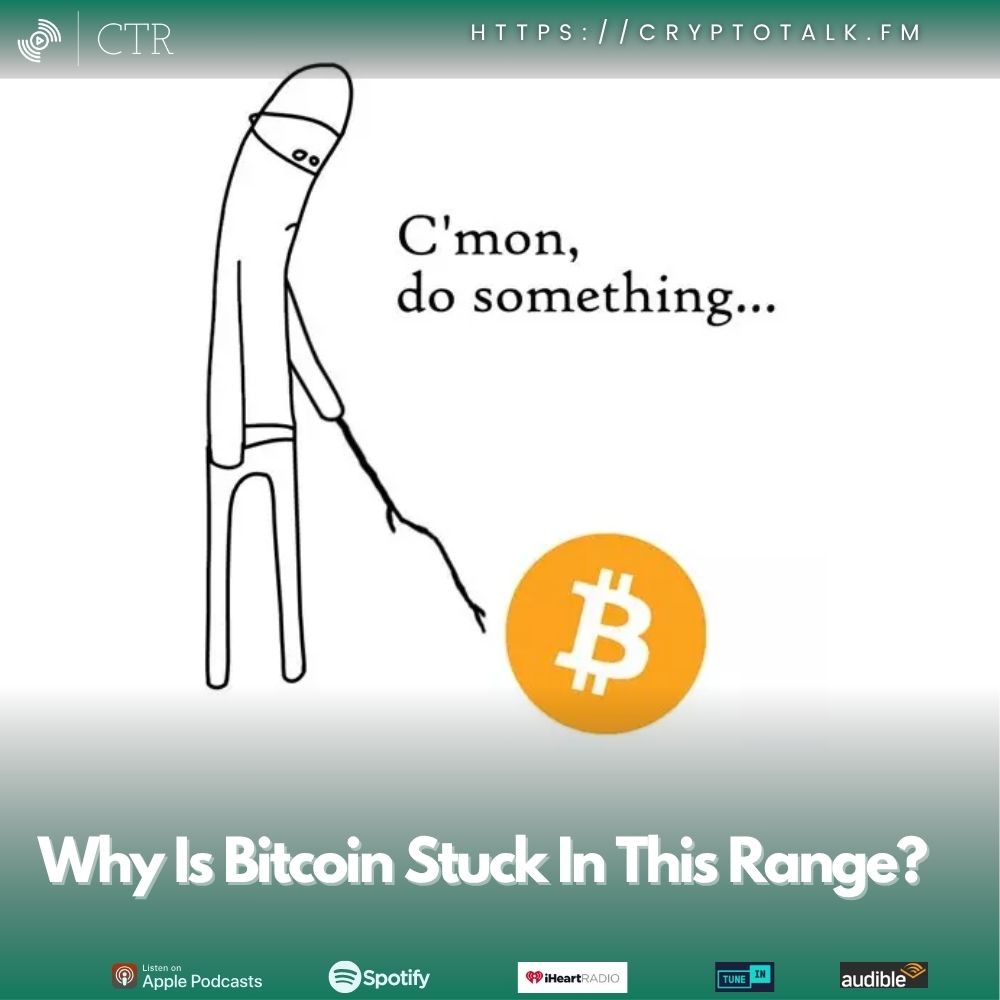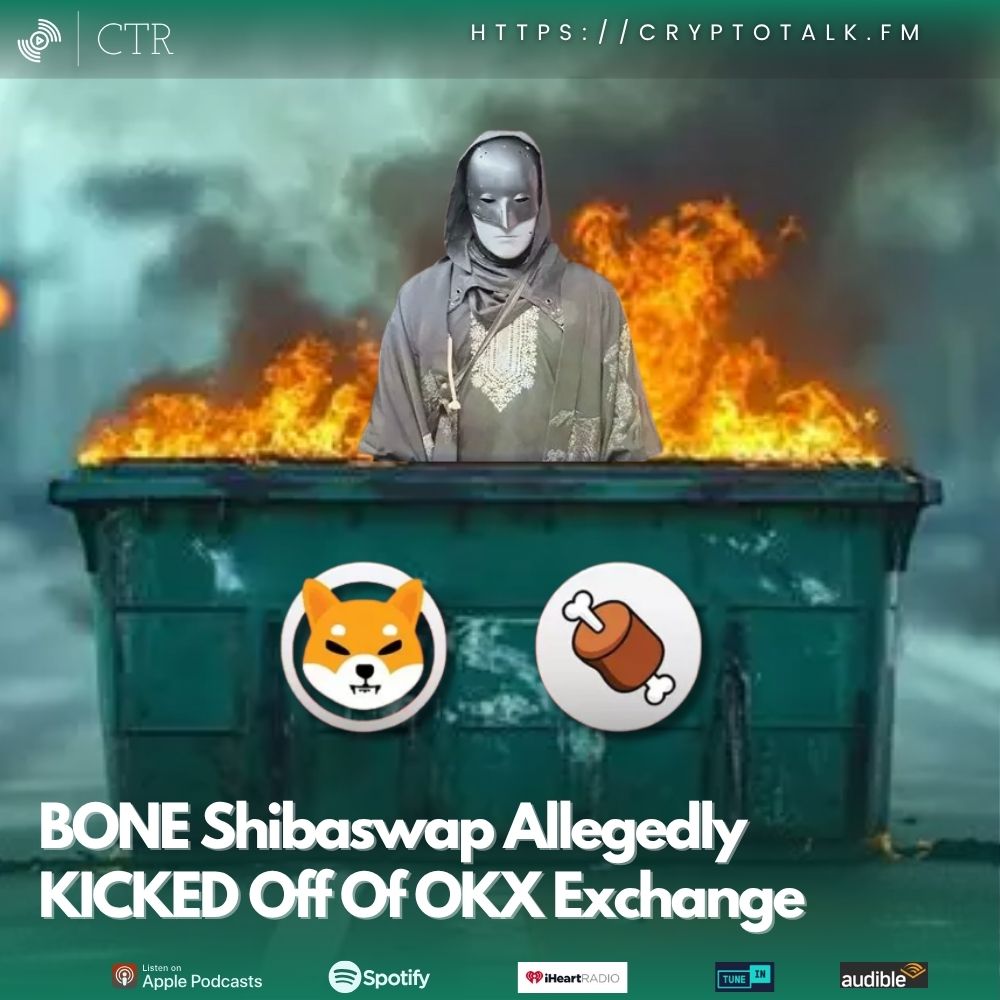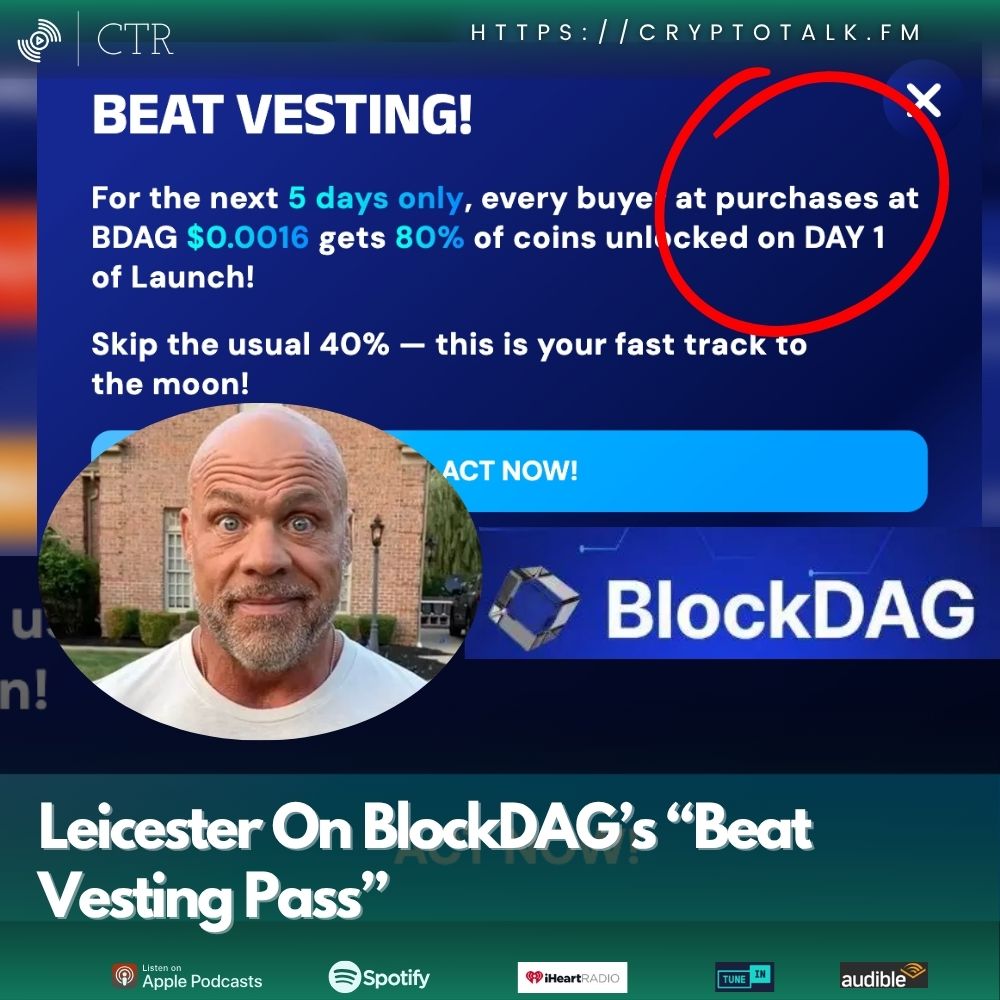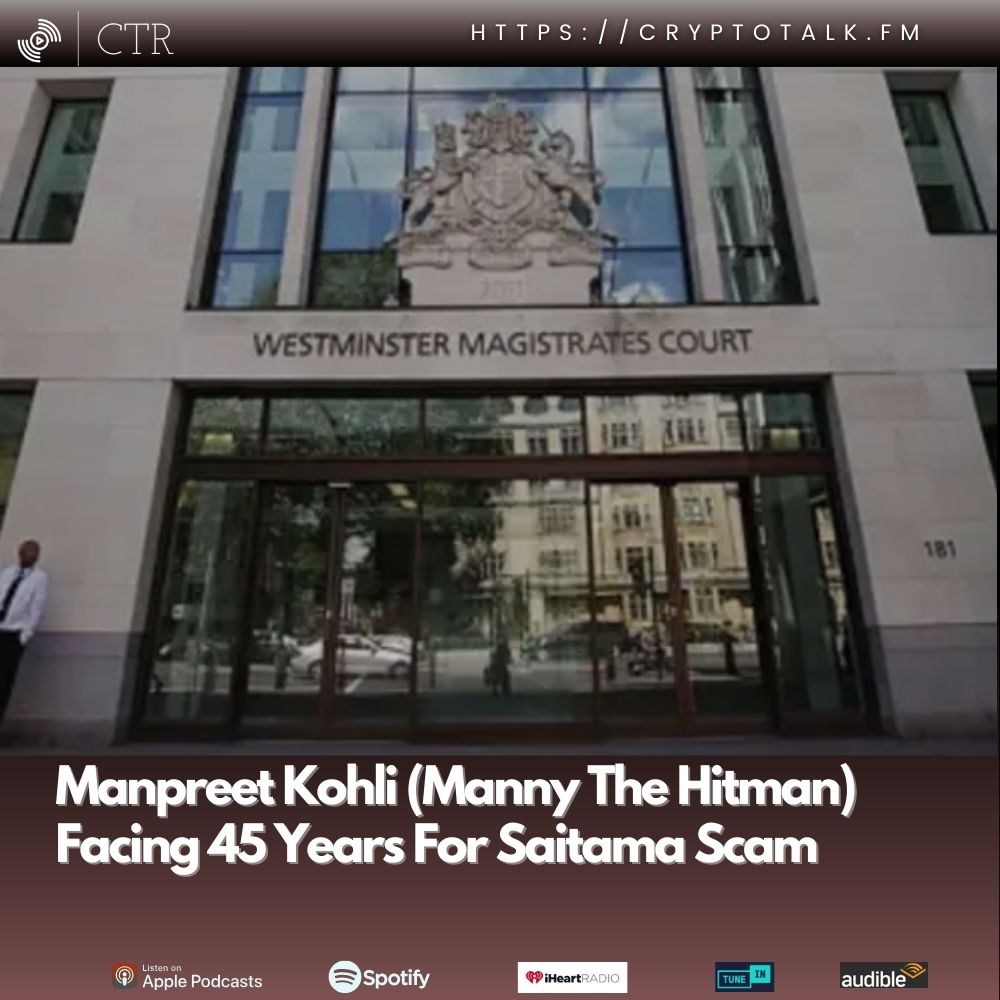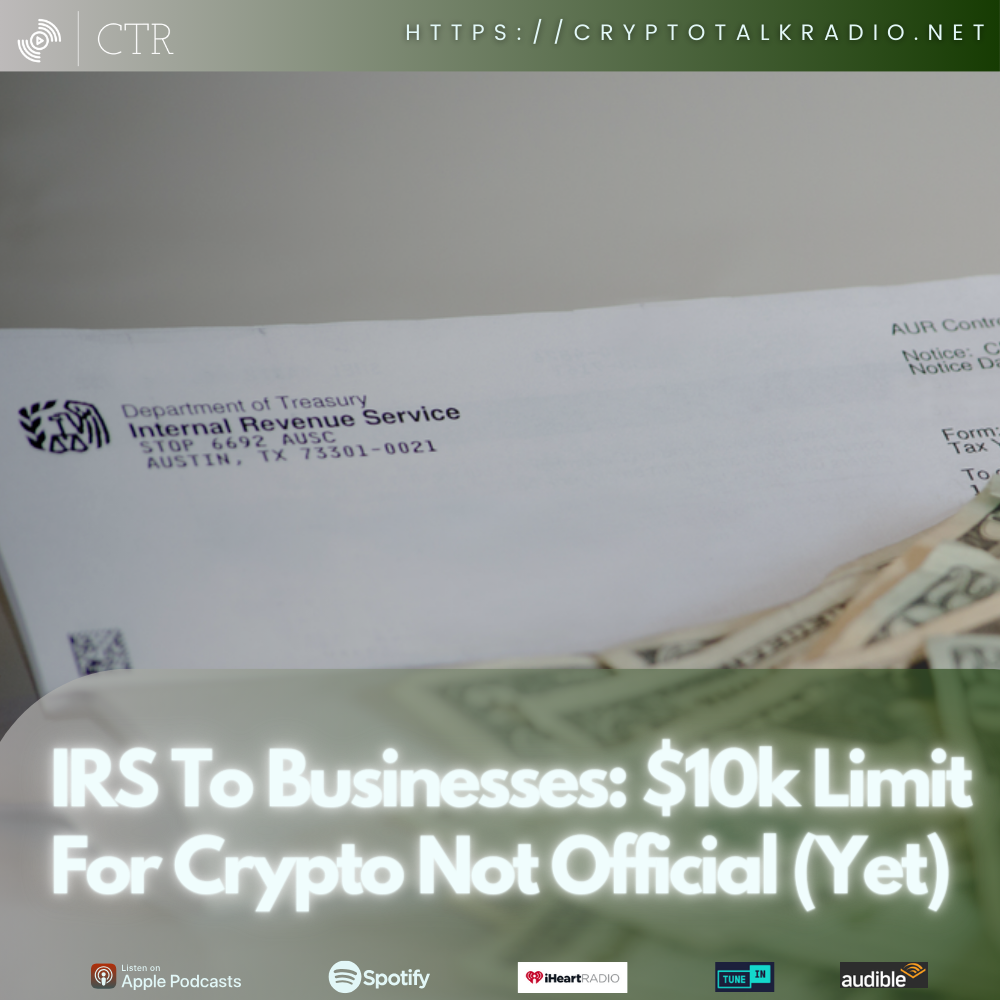[00:00:01] Welcome to Crypto Talk Radio, the podcast for everyday investors like you. Visit us on the
[email protected] and now here's your host, Leister.
[00:00:13] Thank you for that, Bailey. And welcome everybody out there in Crypto Talk radio
[email protected]. am I the only one feeling like crypto's boring right now? Because it feels boring. I was preparing for the show and I got other shows that up that are uploaded roughly around the same time. Wrapped up. Those were a lot more interesting. And then I realized, you know what, I got to do this show. And I said it's boring. Like it really, it's just dull and dry and uninteresting and not it. There's no energy, there's no excitement. It's boring.
[00:00:49] I'm going to muscle forward because that's what I do at CryptoTalk FM, but it's boring straight up. So let me talk something personal because I think that'll be a little bit more entertaining. I've got.
[00:01:01] We. We finished a major fix on my garage.
[00:01:06] The whole frickin inner foundation inside was cracked. There was 1, 2, 3, 4, 5, 6, 7. 7. It was like a. Like a wheel hub.
[00:01:17] 7 outward facing cracks that went all over the place. And then it was in the dead center. There's just this big chunk of concrete that was kind of standalone. It was weird. It was terrible. Just completely cracked and shifted. And it seemed like it was because of the soil. It was sitting on the soil. Everybody's garage is like this, so everybody's gonna be subject to it. So I got that patched up. It's. It's repaired.
[00:01:41] The next step is to stabilize the building itself because it's leaning. Then epoxy, after we get everything all stabilized and then we're going to be doing some renovations. But until that time, because that's gonna be August, I'm guessing, so I'm running out of money.
[00:01:56] We're gonna be doing some veneer work that's gonna look really nice to match the new retaining wall, which already looks nice. So I'm working renovations, spending money on renovations, increasing value, because that's what you really should be doing is improving your value and improving your situation. And crypto certainly ain't it right now. But we'll talk about it, see what we can get out of what we see on the numbers.
[00:02:23] CoinDesk.com and we're going to zoom out to the month chart for bitcoin since bitcoin currently looks a little bit better. Ever slightly than it did before. A low of just shy of 108 grand, a high of 109 grand. Currently trending upwards about 109ish grand with an upward trend. I wouldn't say it's a strong upward.
[00:02:43] Some people online were talking about the fact that Bitcoin seemed to be stuck in this hundred thousand to one hundred ten thousand range for bizarre reasons. And we'll be talking about that here in a second. But what I noticed was not about bitcoin, it was really about Ethereum, because Ethereum over the past 24 hours, a low 2500 bucks, a high 2600 bucks. Currently at the 2600 bucks and trending strongly upward. And I said multiple times, Leister did that Ethereum usually is going to be the marker, at least from my lens, as to whether we truly are going up or not. If Ethereum starts to run, I can trust that we are expected to go up across the board, not just Bitcoin, which has been the case historically. Conversely, then BNB did drop a little bit. Not crazy, but I found that interesting that once Ethereum started to run up, that BNB started to go ever slightly down and meanwhile all the other stuff like xrp, Solana, et cetera, was all having some upward momentum. Hopefully you're having an opportunity to take some profit off of if you listened to Laser, if you listened to your uncle, and hopefully you did and you bought into the course because Lyster told you multiple times they can't steal you. Wrong. This is the moment, right? We, I told you, you know, because it was obvious everything's linked to Ethereum. I said Ethereum is the center. It's. It's the center of the hub.
[00:04:07] Everything else not named Bitcoin seems to benefit from Ethereum's run. Ethereum does not necessarily benefit from Bitcoin's run, but Bitcoin partially benefits from a theory's run. Everything seems to tie into Ethereum. Now, the thing we lack with Ethereum, arguably, ever since we changed to proof of stake, Ethereum's performance has been nowhere near what it likely could and should have been.
[00:04:32] That told me that proof of work might have been one of the strong catalysts for the performance that we saw in 2021 prior to them shifting over to proof of stake. And that might have been spurred by the various miners and their activities, which of course are no longer the case. And now it's just all validations staking.
[00:04:51] So it's possible. I can't say for sure, but it's possible that we Also see with this run on Ethereum, money flow in the direction of various proof of work algorithm tokens and we have to watch and see what impact that has on a true run for the so called altcoins in the near future.
[00:05:09] Ultimately I just want people to come back, give my credit because I told you that, you know, if Ethereum is the key, it always has been. It was obvious. Now you're seeing kind of the fruits of that statement.
[00:05:21] Of course we have to see if this sustains, that's the next measure. Does it sustain, does it hold or does it go right back down again?
[00:05:30] As I watch it, it was a strong upward trend by far in a way, you know, over almost 200 bucks. But we still, I remind the all time high was like $4,800. We're nowhere close to that. So until we see much stronger run, we got a ways to go.
[00:05:49] Over the past month it only got as high as $2800. So not very again, the volatility is nowhere near what we would expect it to be by now given what Bitcoin was able to do. Speaking of Bitcoin, again, people were asking, as I mentioned earlier, why it is that Bitcoin simply did not want to go outside of this little window of 100 grand to 110 grand.
[00:06:14] Obviously there's a lot of different inflows for bitcoin outside of regular spot trading and regular options training, etc. But a lot of these questions are now starting to hit a fever pitch to try to understand why what's going on with the price and the price changes and everything else. There's a couple of theories and I figured I would go through these, share my thoughts about what I feel is happening on bitcoin. And to be fair, I'm not nearly as fixated on Bitcoin as everybody else is. Like I understand its value and I'm not dismissing its value and I do encourage you have some. I'm just not as so fervent as everybody else seems to be on Bitcoin compared to Ethereum. That's, that's just me.
[00:06:57] And I did start to see some YouTubers kind of come around, you know that people that I knew before infrequently talked about Ethereum all of a sudden are saying what I've been saying to be the truth because, and they don't come give my credit. But that's, that's how I roll right it for me, I see the obvious on it. I wasn't seeing Bitcoin will have wealth in it, but it feels artificial, it feels fake, it feels like it's not. It feels like it's not true wealth. It feels like it's just what the heck's going on and why is it that this goes here?
[00:07:33] So let me go through this and then I'll share my thoughts about what's going on. Personal opinion. I'm going to go through all of these. Okay? There's a couple of people that have chimed back with some of this and provided their thoughts, and that's what I'm going to be responding to, is that their opinions of whether I concur or disagree.
[00:07:51] So the question was it's like there's billions and billions of dollars of money flowing into bitcoin. We know that's happening. We know that companies are buying bitcoin at a rapid pace, yet the price doesn't want to shift significantly, even though there's only so much bitcoin to go around.
[00:08:08] Now, some people think that the whales are basically, I don't want to say wash trading, but they're essentially wash trading the bitcoin, right? They buy it and then they sell it, and then they buy it and they sell it, right? So picture a scenario where their average on the bitcoin because they've been buying for a while. So let's say microstrategy, let's say their average on a price of it was 90,000 bucks. And they turn around and they try to sell it for the current market rate of 100-8000-bucks. Okay?
[00:08:37] That's a significant profit per. And then you sell millions and million, right? So the theory is that maybe what some of them are doing is that they bought at so cheap and now they're basically selling off at market rate and taking the profit and going that would then cause the price not to move if they're indeed selling it at market rate. So there's a strong theory that some of these whales that are scooping up might be in that category. Now, the counter to this, and this is something I want you to be thinking about, part of the problem with looking at these articles that tell you this company just bought 500 bitcoin and all that, part of the problem with that is that by the time you see that article, it might have been months or years when they made that transaction. It might have been a long time ago. And they're doing it now to trigger FOMO more than anything else. We know that's gotta be the case because we see a lot of times the inflows on the non institutionals seem to increase with all of these different articles, but we know that a lot of these companies have already committed whatever they were going to commit to those purchases. Like you could have one where they bought like a thousand of it. Thousand bitcoin and then they trickle out news because they pay for it or whatever. Or somebody got an inside scoop that was leaked, quote, unquote. Yeah, we just bought 200 bitcoin here and 200 bitcoin here. Right. And 500 bitcoin here, 100 bitcoin here. It's all the same transaction. Right. But it gives the impression of frequency of purchase. That's not real, it's fake.
[00:10:11] Designed to pump your your impression about what's happening and cause you to fomo. I can't prove that's what's happening, but it would make logical sense because there's too many of these articles that come out talking about these companies buying significant amounts of bitcoin all around the same time. We didn't see anywhere near this many announcements back in 2021 when things Bitcoin was running up like crazy. So what changed? We certainly didn't see it with the FTX that, you know, when it was crashing, right, and it went down as far as 12,000 bucks. We didn't see that these companies were scooping these major dips. So what changed?
[00:10:47] But is it possible that those companies actually did buy significant during that time? So their average is significantly lower and thus the purchases that they're talking about now have happened a long time ago. That's what I think might be more strongly the case. I can't say that's the case, but that's what I think is really happening. The other thing I thought about with this statement was the retail, you know, the regular layman traders that are out there, the amount that they're buying is dwindling, in my opinion. I do see people buying, but I'm saying it's dwindling compared to what it was.
[00:11:26] And most of the purchases are the wealthier. I called out in an older episode the fact that most younger people have a faulty notion of price. They're expecting to be able to buy one bitcoin. They don't realize that you don't really have a price target or price cap, that you can just put as much money as you have into it and it will have value just like anything else and you're not beholden to own just one. So they see a price of $108,000 and it might cause them to back off. And then they go to some garbage token, right, where you can get a million of it for 10 bucks or something.
[00:12:01] That's also possible that some of those are sitting on the sidelines waiting for the so called altcoin season and the money is actually flowing away from bitcoin that would cause the price movement. It just so happens that right now, because of oversold, in my opinion, bitcoin, it's kind of a bubble. That's why I said I felt like it was fake, it felt like it's not real and that it's going to crash back down. I can't say that it will, but it feels like it from my lens.
[00:12:29] So then this person, sitebringer, sitebringer is on X and he does, he's underscore, the Prophet underscore. And he does a lot of reading of signals, reading of charts and reading of all this. And he looks deeper than just, hey, the chart's going up. And you know, the, the MACD is that he does a lot deeper dive and I think he does a good job. But I wanted to talk through some of the bullets that he made because in my opinion, I think he's good in a lot of this. But some of it I wanted to clarify for people, the first he talked about was about ETFs. I said that the ETFs, in my opinion were going to be the strongest point of access for these, for the layman investor, because they are insulated from the inherent risk of holding the underlying asset, number one. But number two, when you think about what the ETF is doing, the ETF is causing circulation of fiat at the end of fiat value, right? At the end of the day, as it buys and sells and trades, it's fiat that's being bought and sold, not the cryptocurrency. The, the cryptocurrency is essentially not circulating when it's part of the ETF transaction sets. So the more people that get into ETFs, my point is the more fiat value shift that you see in volatility that you experience, that means you're quicker to experience trusted value. You don't have the same risk that you would have if you're holding an underlying asset. The downside is that because you don't hold the underlying asset itself, the amount of value that you realize is no longer insulated to you. The whole notion of cryptocurrency and you being your own bank right, is predicated on you holding it yourself, having in your own wallet, having total control of it. And as it increases in value, then you control when you transact it, et cetera. In the ETF world you don't have that control.
[00:14:28] You're delegating it to a custodian. The custodians value is based on the performance. The performance is based on factors you don't control.
[00:14:35] And said performance might not be as great as you might want it to be compared to what it would be if you held the asset. So he is correct in this one and I wholeheartedly agree. But he talked about the fact that with these companies like the blackrock's of the world, Fidelity's of the world, they're buying fiat, they're actually buying it and they're storing it, buying it and stashing it, buying it, stashing it, buying and stashing and buying and stashing it. And then the ETFs are being provided for people to trade and benefit from it. But the owners of those assets are still the blackrocks and fidelities of the world. And that money is just really going one way. They're going off the exchanges. That means there's less for buys and sells and transactions. And I said that you need buys and sells in order for price to really move.
[00:15:20] Well, it's going to hit a fever pitch at a point if they keep on absorbing all the bitcoin that's on the exchanges.
[00:15:27] The reason that this is important is that the people who are sitting on bitcoin right now who refuse to sell it, they're just as culpable for why the prices are moving. Because the presumption is that there would be some people who would overcharge the blackrocks and fidelities of the world to buy the bitcoin. Now of course they can do over the counter, you know, back deals and all that stuff, but I'm talking at some point even the exchange is going to run out of supply. So to get it from somewhere, and this is where the miners and the proof of work site are good because they hold stashes of bitcoin, they have to pay the bills, they're willing to sell it and they have to be smart enough to sell it at a premium so that that triggers the price to go up. We haven't hit that point of saturation yet because there was excess of supply out there. And until we get to the point of that breaking point for the ETFs absorbing so much, we're not going to see any significant price movement. That I think is a very good, solid, salient point.
[00:16:29] The other point he talked about is around exchanges, central exchanges, mostly central because we're talking Bitcoin. But he was talking about the fact that when you say, okay, how much liquidity do these exchanges really have? Like really have. When you think about an exchange's liquidity, we're talking about how much do they have in terms of the reserves and how much is actually being exchanged through the exchange. His theory is that when there's these trades, it's not really trading the asset. It's really.
[00:17:03] So consider, you know, leverages and options and all these other, you know, fake schemes that are designed to use price at an inflated amount, but they're not really trading the asset. So if you say I'm doing 10x leverage trade on XYZ, nothing's really exchanging hands during the price shifts. Nothing's exchanging hands. Right. There's no real value shift or change that's happening unless there's a liquidation or a settlement, which doesn't happen on the frequent basis when you're holding it at that. If you do you know something where you're borrowing, so you're borrowing an asset, let's say you take a loan against it and then you're expected to pay it back. That that's not shifting the token.
[00:17:47] If there's not change of hands of the token, there's not an actual trade and settlement for the price different than what it was, the price is not going to move. Well, that means that most of the exchanges, if they're not doing straight spot trades, and when I say spot trades, I'm talking mostly market but also limit. But when you're not seeing spot trade activity of the assets and instead it's just a bunch of borrowing against the assets, you're not going to see the price move to a significant degree because there's nobody that's offering it for the higher price and somebody buying it at that higher price or vice versa, 100% agree with what he's talking about there.
[00:18:24] The other party talked about was around the. What I talked about with the miners and the fact that a lot of these people that were older holders and or miners that were stacking and stacking and stacking were not selling at the higher prices or if they're doing it, they're not doing it in a way that's going to pump the price up. They're doing in a way just to kind of those steady states like, hey, I'm selling mine at the current market on a down period because I need the money for more rigs or Something they're not saying, you know what? I'm going to put my Bitcoin I, my average value right now is 50,000 bucks. I don't care. I'm going to put it up for sale for $200,000 because I can, right? If you have it and you know there's a supply crunch, that's what you're normally supposed to do, sell it for a premium because you know you can. That's what a lot of them aren't doing. I heard, I think it was da Vinci, Jeremy, who had talked about there's no reason to sell it. And I talked about the fact that you could do loans and everything else and a lot of these people are doing that. They don't want to sell it. There's no reason to. They'll just do loans for the money that they get.
[00:19:29] Okay, that's another part. And then liquidation is the only way that it would get back into circulation because which would potentially trigger price movement and that would be to the downside usually. So the idea that older holders or whales or miners are sitting on supply and they're not selling it, or if they do do not sell it for the premium that they should, is a very strong likely candidate for it. I 100% agree with this as well.
[00:19:57] One of these was kind of tin foil, which was the idea that these large ones that are mostly the ETFs but also some of these other bigger players, what they're doing is they're colluding to freeze prices. So they're basically saying, you know, we want it, we want dedicated pricing, we want guaranteed pricing. This actually goes to the theories that Do Rug Pull, AKA Do Kwon, right. With the Luna crash and everything that's going on, that he negotiated some backroom deal with an organization, I think it was jump crypto in order to basically get some Luna at a certain fixed rate and then get some Bitcoin for reserves. And, and so what they're saying here, what he's saying is there's this collusion happening for trading at a very non volatile price, a price that's not subject to the whims. Well, think of how that would work. In order for that to really work, that means the exchange is going to have to take the risk of a significant shift in exchange for a large order. So let's say that the price of Bitcoin currently is trading at an even a hundred thousand bucks just for safe numbers if it's trading at a current hundred thousand bucks. But let's say BlackRock and it may not be them, but let's say BlackRock comes in. BlackRock says, well, we'll buy, you know, 500 Bitcoin. But we don't want to pay a hundred thousand bucks. We want to pay 90,000 bucks. Because it was just 90,000 bucks two weeks ago. We want that older price.
[00:21:22] Well then the exchange is going to have to eat that risk of the delta of the value of the bitcoin between the price that BlackRock wants and the current market rate.
[00:21:31] So that means it's a short, right? It's being shorted. Essentially we got to find 500 bitcoin at 90,000 bucks.
[00:21:39] That means we have to either depress the price, which is artificial on behalf of the exchange, you know, market maker, right. Artificially suppress the price, or we have to find people who are willing to sell and entice them to sell their bitcoin at a lower price price that goes to artificial price presentation. Meaning I'm going to show you a price that is higher just to get your bitcoin. Well then how does that work? That means the exchange has to find the money from somewhere else and then you start getting this house of cards.
[00:22:09] And I believe it was ftx, one of these exchanges that failed.
[00:22:14] It turned out that they were sitting on shib and I think even floki as some of their reserves, which is unthinkable. You're talking about some of the most volatile assets possible as reserves backing. And the theory was that they were using some of these extra volatile reserves in order to generate some of the money as shortfall for some of these other assets that was out there. So you take a bitcoin in that scenario I described, where we're trying to give it to the big players at a discount price.
[00:22:43] We need to now get it from somebody else. But we need to make it worth their while and entice them. We use some of these garbage assets and the value appreciation of those because they're more highly volatile, either to directly profit or to compensate those people that were selling their assets. That's the theory. Whether that's happening, it wouldn't surprise me, but it would be very difficult to prove. It would be very difficult to prove that that kind of collusion was actually happening. What would be easy to prove would be, let's say that there was some sort of programmatic integrations of code that was written between these big players and these exchanges where they know right down to the second when the price hits a certain point, which you don't, you can set an order, a Limit order. But you still have to depend on the exchange to be honest with you as to when it hit that price. But if they're tied directly to the order books, I'm talking like the Blackrocks of the world, they know right at the moment that it hits that price and they can initially do a trade at the price, let's say it's a limit order or stop order for that price long before it's going to hit it. So they can see okay, it's trending in that direction. We can put in an order now and then once it hits it, go and fill the order. But because they're integrated, they're keeping tabs on it. They can instantly fulfill the order, which you cannot do.
[00:24:01] So that's another. Is that illegal? No, that's perfectly allowed. We do that now. Fidelity does that.
[00:24:08] So is that possibly happening? It would not surprise me to see that would. That would be the case.
[00:24:15] The other part, and this one is an interesting thing, he gave and I'll call this a tenfold, but he basically gave something for people to think about. He gave something that said something to the effect of the reason that we're not seeing any price movement is because it's not supposed to.
[00:24:34] Because if we allow it to do significant moves, there's an ability to suppress it again.
[00:24:42] So I have my own opinion, I'll get to in a second. But basically it's saying okay, this might be this artificial depression to hold it back long enough for accumulation. Right. The big players are purposely suppressing the price through their own machinations so that they can stack enough of it such that when it shoots off like a rocket, it's never going to come back down again. Now my theory on that the problem is with that is we know that bitcoin largely follows a four year cycle has done.
[00:25:16] So is it possible that it happens that way? It's possible. I don't think that it's to a point like now is the point where it's never going to come back again. I don't, I don't agree with that. I think the only time we could get to where that kind of skyrocket effect would ever happen would be you'd have to have less retail than institutions. Right now retail is roughly half the supply. If I recall you got a little bit to Satoshi allegedly holds. We don't know what happens. Like we don't know what happened with Satoshi. Could be Satoshi spins back up again, cashes it out. I think he last I saw was like $120 billion worth of tokens. And then there's a sell off. There's all sorts of catalysts, negative catalysts that could occur that would change what this is saying.
[00:26:00] But I'm intrigued by what it's implying. I just don't know that I agree with it.
[00:26:06] But it's implying this idea that, okay, well, we shouldn't necessarily worry so much about why it's not moving. We should really be thinking about who is it that's making sure it's not moving and what did they know?
[00:26:19] Well, that's kind of tinfoil because the basics of price movement have never changed. And bitcoin is not insulated from the basics of price movement. The basics of price movement is very simple. There's demand for an asset and there's supply for an asset. It's that simple.
[00:26:38] Now we could argue nobody's offering their bitcoin up for sale at a premium. Well, why are they not doing that? Because they are being told by news articles like these that bitcoin is going to shoot up to a million dollars. We're being told that this person's prediction is that bitcoin's about to hit $300,000 by the end of the year. We've heard these narratives, these, these statements made for years and it's never panned out. I'm not suggesting that it's a done deal and it's dead or none of that. I'm saying that a lot of this is smoke.
[00:27:13] That doesn't mean you shouldn't hold some bitcoin. You just have to be realistic. It's like if you hold some bitcoin, hold it because you know that at some point it's going to make you some profit and make sure you take the profit. When come time, if you're able to stack enough bitcoin to where it doesn't matter. Right. Without putting yourself in the, in the drink, then absolutely. You know, if you can put enough that it can jump up to a hundred thousand dollars straight, that's great.
[00:27:39] But the idea that you're going to become a millionaire off bitcoin, I think is a far cry. And I wouldn't want people to sell their home or any of that crap because of these articles that are trying to trigger you to fomo. And I think that's what he's getting at is, well, think of all these people that are doing. They might be sitting off in a room and suppressing the bitcoin or it's just not nature of supply and demand and we've not hit a point where there's enough motivation to offer the supply up for sale.
[00:28:10] And it's possible that the reason that we're not offering it for sale is because of all these articles telling you not to. That's entirely possible. And at some point though it's going to hit a breaking. You know the mining companies, they've got to, they got to make some money, they got to get some money because they got to pay those bills. Especially if the electrical goes up.
[00:28:26] They're going to have to sell.
[00:28:28] Do they sell at a premium is the question. That's the only question. That's what they should do. Maybe the miners are waiting for capacity crunch. Maybe they're waiting for the exchanges to completely run out where now the miners hold all the cards and they would trigger a price appreciation. Maybe, but let's say they do.
[00:28:49] If they do, there's going to be people that sell because once it hits certain point, like it's just the nature of finance, once it hits a certain price point, they're going to sell it. So somebody that's, let's say somebody's sitting on one bitcoin right now, it's worth a hundred thousand bucks and it goes to $500,000. They have a strong probability of selling because they realize, well geez, I put my whole life savings, oh my right. And then now it's 5x and $500,000 and it's life changing money. The temptation is too great. We're putting too much trust in people's ability to just hold on to assets. I don't buy that theory.
[00:29:26] Maybe I get it wrong. But I think we're at a point where people will sell.
[00:29:30] So I think we're going to still have that cyclical wave up and down.
[00:29:34] But I do think that over time, you know, to me you're talking like 2030, 2040 before you start seeing significant numbers. That's what I'm, that's where I'm at. But you know, I'm a conservative type of person in that regard. So that's how I perceive. I love what the person said. I agree with most of what they're talking about.
[00:29:51] I don't buy the tinfoil too much. I do think there's just some basic fundamentals as to what's going on, which is supply and demand is kind of off rocker. And until we get to more supply being made at a premium, we're not going to see significant price movement. And that's okay. It doesn't mean you shouldn't hold bitcoin Nothing's changed, right? I still think you should hold some because we will see some price appreciation. How long you hold it really goes to your tolerance of risk.
[00:30:18] I'm going to close up because you know, I'm pretty much good for the episode. But I wanted to make a real quick follow up comment because I'm not doing a swag on Block Bag that rhymes. But I want to make a follow up comment about Block Dag because there was something that was spinning around recently in that Voss coin. He said it too. And it's. It's now the big Binance stuff talked about it. A whole bunch of people talked about it.
[00:30:40] So Block Dag allegedly used to be called Euler Network E U L E R Network and Binance stuff did a really good video where he covered about the fact that the logo, the little spinning cube is the same thing. And somebody else chimed in and said that in the discord the Block Deck team would acknowledge that yes, it was a rebrand of Euler Network but they would never admit it publicly.
[00:31:03] I just wanted to share my thoughts about it. Having done a little bit of digging on the Euler Network, most of the information that was there is gone.
[00:31:10] But here's my thoughts on this one.
[00:31:13] Part of the problem with when you do an initial brand and the Euler Network, it did a pre sale and I think they got to like $9 million or something really low.
[00:31:22] Part of the problem with some of these launches is you do a launch, you have all the great ideas in the world, you think it's going to be something and you realize that either because of something you learned, something you saw something you heard, that this isn't going to work.
[00:31:40] For what I understood, the Euler Network never gave the money back to the people that bought in on that pre sale. That's what I was given to understand. I don't know for sure if somebody knows. Hit us up Crypto Talk fm, hit the comments.
[00:31:52] But what I was told is that the people never got the money back. What I don't know is what people were told at the time.
[00:31:59] Were they. Because you know, chances are was Telescam or something.
[00:32:02] Were people told, okay, this is what we're going to do. This is our next plan. We're going to rebrand. Were they told any of that stuff? Because if they were told the Euler when it was Euler, if this is 2023, I believe it was. If they were told in whatever forum that yes, we are going to rebrand and it's going to Be block dag and you're going to keep your tokens that you bought. It's just going to be on the block bag side. I don't have a problem with the rebrand.
[00:32:30] If people were not told that was happening and they just disappeared and then showed up again as block dag, that would be a problem. Somebody on Binance Stuff's channel gave the impression that there was a. Some New Year's, something like a raffle or something that blocked. That did. And they never got a. Any kind of tokens or payout or anything else. So there's a lot of that. There's a lot of this. Again, talks about funds lockup. I talked about the biggest risk I saw was funds lockup. If funds lock up occurred. But when it changed from Euler to block dag with no disclosure about what was going on, that would be a problem. If they were told, then I would, I, I can't hold that against them because a lot of projects do that. They just. Okay, we started a thing and we got it right. Look at Phantom, right? Phantom.
[00:33:16] It launched and it did what it was doing. And I thought it was reasonably fine. I thought the DAP was garbage, but it was reasonably fine.
[00:33:23] And then they turn into this sonic garbage maker maker Dao the maker, you know, and then they're gonna change to some garbage or whatever. It happens all the time.
[00:33:34] I can't really hold that against them because I, I want to say if they told people this is what we're going to do and they told what was going to happen to the money, it's fine. That's the only question I would ask then.
[00:33:48] Did they tell people that they did what happened to the money?
[00:33:51] If they didn't tell people and they rolled the money in the block that without telling them, that would be problems. That's a, you know, it's a Ponzi scheme. So I am not going to hold the. Just the fact that they rebranded against them. It really goes down to what were people told from the Euler network to this business over here. That's the real means test. And I'd love to hear from people if somebody was in the eco, about what happened when it was Euler. If you were in Euler, what happened? What did they tell you? What was the story at that time? Because all that information appears to be gone. I'm not going to telescam beyond that. It's kind of wait and see and we'll have to, you know, I don't think any. They said August or something. I'D be skeptical if something happens in August. I think they'll announce something in August. But again, it's a wait and see type thing to the point I'm not recommending it. I just. I'm gonna wait and see because I'm fascinated at this point exactly what's going to happen with this business.
[00:34:46] Sam SA.
